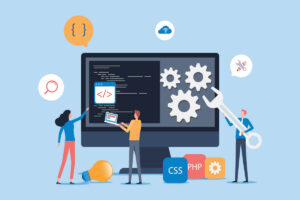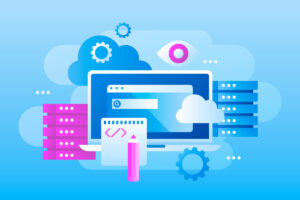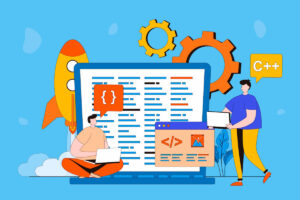In the ever-evolving landscape of web development, Full Stack PHP Development continues to play a crucial role. As technology advances and trends shift, it is important to stay updated on the latest tools, frameworks, and best practices in order to remain competitive in the field. In this article, we will explore the current state of Full Stack PHP Development and predict what the future may hold for this versatile and widely-used programming language.
The Rise of Full Stack PHP Development
Full Stack PHP Development refers to the practice of using PHP for both front-end and back-end development. This approach allows developers to work on all aspects of a project, from designing the user interface to implementing server-side logic. With the rise of dynamic web applications and the increasing demand for seamless user experiences, Full Stack PHP Development has become a popular choice for many developers.
The versatility of PHP as a programming language enables developers to create interactive and dynamic web applications efficiently. By combining front-end and back-end development into a single skill set, Full Stack PHP developers can streamline the development process and ensure a cohesive user experience across all aspects of the application. This approach also allows for easier communication and collaboration within development teams.
Some benefits of Full Stack PHP Development include:
- Faster development cycles
- Seamless integration of front-end and back-end components
- Simplified debugging and troubleshooting processes
Current Trends in Full Stack PHP Development
1. Microservices Architecture
One of the key trends in Full Stack PHP Development is the adoption of microservices architecture. This approach involves breaking down a large application into smaller, independently deployable services. By decoupling components and focusing on modular design, developers can create more scalable and flexible applications.
The use of microservices architecture in Full Stack PHP Development offers several advantages:
- Improved scalability and fault tolerance
- Easier maintenance and updates for individual services
- Enhanced agility and faster deployment cycles
2. API-Driven Development
Another trend in Full Stack PHP Development is the shift towards API-driven development. With the increasing popularity of RESTful APIs, developers are able to create more dynamic and interactive web applications. By separating the front-end and back-end layers, developers can focus on creating reusable APIs that can be accessed by various client applications.
Advantages of API-driven development in Full Stack PHP include:
- Enhanced flexibility and reusability of code
- Improved security by enforcing a clear separation of concerns
- Simplified integration with third-party services and applications
3. Progressive Web Apps (PWAs)
Progressive Web Apps (PWAs) have also gained traction in the Full Stack PHP Development community. These web applications combine the best features of native mobile apps with the accessibility of web applications. By leveraging modern web technologies such as Service Workers and Web App Manifests, developers can create fast, reliable, and engaging user experiences.
Key benefits of Progressive Web Apps in Full Stack PHP Development include:
- Offline capabilities for improved user experience
- Faster loading times and responsiveness
- Enhanced discoverability through search engines
The Future of Full Stack PHP Development
Looking ahead, the future of Full Stack PHP Development is bright and full of potential. With the continued growth of the PHP ecosystem and the advancements in web development technologies, developers can expect to see the following trends shaping the future of Full Stack PHP Development:
1. Serverless Architecture
Serverless architecture is expected to become more prevalent in Full Stack PHP Development. By offloading server management and scaling to cloud providers, developers can focus on writing code and building applications without worrying about infrastructure maintenance. Serverless platforms such as AWS Lambda and Google Cloud Functions are already gaining popularity in the PHP community.
Benefits of serverless architecture in Full Stack PHP Development include:
- Cost-effectiveness by paying only for the resources used
- Scalability and flexibility to handle varying workloads
- Simplified deployment and management processes
2. Headless CMS
Headless Content Management Systems (CMS) are also likely to play a significant role in the future of Full Stack PHP Development. By decoupling the content management layer from the presentation layer, developers can create more flexible and dynamic websites. Headless CMS platforms such as Contentful and Strapi offer APIs that can be integrated with PHP applications to deliver content to various devices and platforms.
Advantages of using Headless CMS in Full Stack PHP Development:
- Improved content delivery across multiple channels
- Enhanced security by separating content from presentation
- Greater flexibility in content management and publishing workflows
3. Artificial Intelligence and Machine Learning
Artificial Intelligence (AI) and Machine Learning (ML) are poised to revolutionize Full Stack PHP Development. By leveraging AI-powered tools and algorithms, developers can automate tasks, improve user experiences, and gain valuable insights from data. PHP libraries such as TensorFlow-PHP and PHP-ML enable developers to integrate machine learning capabilities into their applications.
Benefits of integrating AI and ML in Full Stack PHP Development:
- Enhanced personalization and user engagement
- Automation of repetitive tasks for increased efficiency
- Data-driven insights for informed decision-making
In conclusion, the future of Full Stack PHP Development is promising and filled with exciting opportunities for innovation and growth. By staying informed on the latest trends and technologies, developers can continue to push the boundaries of what is possible with PHP and create cutting-edge web applications that delight users and drive business success.
FAQs:
1. What is Full Stack PHP Development?
Full Stack PHP Development refers to the practice of using PHP for both front-end and back-end development, allowing developers to work on all aspects of a project.
2. What are the current trends in Full Stack PHP Development?
The current trends in Full Stack PHP Development include Microservices Architecture, API-Driven Development, and Progressive Web Apps (PWAs).
3. What is Microservices Architecture in Full Stack PHP Development?
Microservices Architecture involves breaking down a large application into smaller, independently deployable services to create more scalable and flexible applications.
4. How can Full Stack PHP Developers create dynamic web applications?
Full Stack PHP Developers can create dynamic web applications by adopting API-Driven Development and leveraging modern web technologies such as Service Workers and Web App Manifests.












+ There are no comments
Add yours